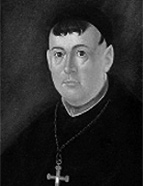

Alongside his political activity, he also had an important career in the Church. After his ordination, he moved to the Monastery of Rendufe, and later to the Colégio de Nossa Senhora da Estrela in Lisbon. In 1785, he settled in Coimbra, certainly so that he could attend classes at the university. He held the positions of Abbot of the College of Coimbra, Visitor General and Chronicler Major of his Order.
In January 1821, he was appointed coadjutor and future successor to the Bishop of Coimbra. The bishopric's incumbent died in June 1822, and Friar Francisco assumed the position, being appointed bishop that September. At this time, he also received the title of Count of Arganil and Lord of Côja. He remained in the episcopal chair for only a short time, due to the political instability that the kingdom faced in the first half of the 19th century. He resigned in 1823 when he retired to the Monastery of Batalha. The final significant moment in his religious life came in 1840, when he was appointed to the Patriarchal Chair of Lisbon at the initiative of Queen Maria II. The Holy See recognised the title and conferred on him the dignity of cardinal.
A significant part of Friar Francisco de S. Luís' youth was spent studying at the Faculty of Theology in Coimbra, where he obtained his doctorate in 1791. Throughout his life he maintained a strong connection with the university, having been a professor there for various periods. Soon after completing his doctorate, he was a maths professor at the Colégio de São Bento, teaching Philosophy. In 1805, he was unanimously accepted as a candidate for the courses of the Faculty of Theology, from which he had graduated. In 1817, he was promoted to Professor of Philosophy at the Colégio das Artes [College of Arts]. On 20 October 1821, he was appointed rector and reformer of the same university. However, he left office in 1823, at the same time as he ceased to be Bishop of Coimbra.
This work is financed by national funds through FCT - Foundation for Science and Technology, I.P, in the scope of the projects UIDB/04311/2020 and UIDP/04311/2020.
